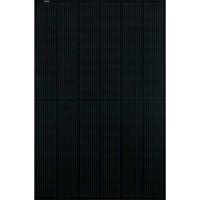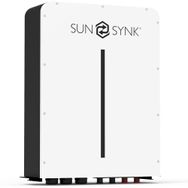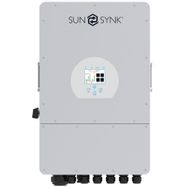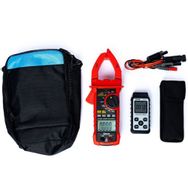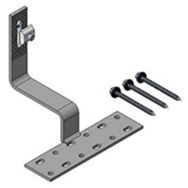Solar Panels
High-Efficiency Solar Panels for Home & Business
YESSS Electrical offers a wide selection of high-efficiency solar panels from top brands like Osily Energy, Ulica Solar & Jinko Solar.
Our range features powerful 108-cell monocrystalline solar panels with power ratings from 405W to 440W, ideal for maximising energy output and generation in residential and commercial settings.
These slim 30mm panels are designed for optimal performance and seamless integration into your solar PV systems.
Key solar panel features
- Top Brands: Osily Energy, Ulica Solar, Jinko Solar
- High Power Output: 405W - 440W
- 108 Cells: Maximise energy generation
- Monocrystalline Cells: High efficiency & performance
- Slim Design: 30mm depth for sleek aesthetics
Browse our selection of solar panels and find the perfect solution for your next electrical installation project.
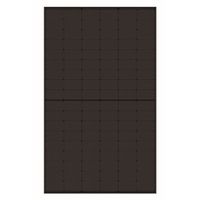
440W Solar Panel, N Type Mono Crystalline, 108 Cells, IP68, Tiger Neo Range

435W Solar Panel, N Type Mono Crystalline, 108 Cells, IP68, Tiger Neo Range
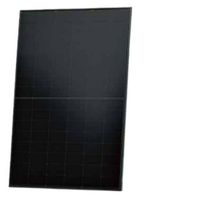
455W Solar Panel, N Type Mono Crystalline, 96 Cells, IP68, Tiger Neo Range
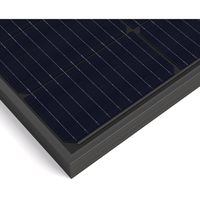
405W Solar PV Panel, 108 Cells, Black, IP68
FAQs
What is a module cell type?
Panels are made up of module cells, with the most common being monocrystalline, polycrystalline, amorphous silicon and concentrated PV. Monocrystalline panels are renowned for their high efficiency rate and lifetime value, offering high sunlight absorption rates, even on cloudy days.
Do solar panels work on cloudy days?
Solar panels will still generate electricity on cloudy days, although they may not operate at peak performance compared to bright and sunny days. The panels are designed to maintain efficient operation whatever the weather and you'd be surprised at just how effective they can be. For example, rain can wash away dirt and dust, making the solar panels more efficient, and even moonlight (a reflection of sunlight) can also produce electricity.
What is the lifespan of a solar panel?
Solar panels are expected to last around 20-35 years. To keep them in peak condition, it is recommended that you arrange regular cleaning and an annual inspection and service from a solar energy professional. If the solar panel system is installed in an area prone to debris and dust, you may need to arrange cleaning every few months to keep your solar PV panels operating effectively.
What are the benefits of installing solar panel systems?
Installing solar panels allows you to harness solar power to heat your property and lower your electricity bills while you do so. This renewable energy source reduces your property's carbon footprint with the added benefit of the potential to sell excess energy back to energy providers for long-term savings. Despite the initial upfront cost, solar panels can pay for themselves in the long run through energy savings and reduced electricity bills.
Can I install panels myself or do I need a professional?
It is always recommended that you hire a specialist solar panel installer to ensure expertise, compliance with regulations. You'll also have peace of mind that your solar panel system is installed safely and securely, and able to operate at peak performance.
Will solar panels increase the value of my home?
Residential solar panels are a great way to increase the return on investment when you come to selling your property. Solar panels appeal to eco-conscious buyers, and many people appreciate the monthly energy bill savings that solar panels provide.
How much do solar panels cost?
The cost of solar thermal panels includes installation, the panels themselves and a solar battery and can vary depending on the number of panels needed, which is often dependent on the size and energy needs of the property requiring solar energy. For more information on how much solar panels cost for your project, contact our team for more information.
How does a solar panel system generate electricity?
A solar panel system generates power by absorbing sunlight through solar cells, which convert solar energy into DC electricity. This direct current is then converted into AC electricity by a solar inverter, making it suitable for use in homes and businesses.
What happens to the excess solar energy generated by my system?
If your solar system produces surplus electricity beyond what you use, it can be exported back to the grid. Thanks to the Smart Export Guarantee, homeowners can be paid by their energy supplier for the excess electricity they export, helping to reduce energy bills, carbon emissions and achieve energy independence.
What are the differences between monocrystalline and polycrystalline panels?
Monocrystalline panels are known for their high solar output and overall efficiency, making them ideal for smaller roof spaces. Polycrystalline panels, while slightly less efficient, are often more cost-effective and still provide strong performance under direct sunlight.
Can solar panels store energy for later use?
On their own, solar panels don't store energy, but when combined with solar batteries or a battery storage system, they allow you to save excess solar energy for use at night or during periods of low sunlight.
This reduces reliance on the grid and supports energy independence, allowing you, for example, to charge an electric vehicle on free electricity overnight.
Are solar panels worth it for homes with limited sunlight?
Yes, modern solar panels are designed to work efficiently even in lower light conditions, including east or west-facing roofs. While north-facing roofs may have lower solar output, a well-designed solar array can still deliver meaningful energy savings over time.
What is a photovoltaic system?
Photovoltaic solar energy systems consist of solar modules, a solar inverter, mounting equipment, and often battery storage. They're designed to generate energy from the solar spectrum, providing a renewable source of power with minimal maintenance required.
How many solar panels do I need for my home?
The number of home solar panels you need depends on your average electricity bills, energy usage, roof space, and the type of solar cells used.
For a detailed estimate, it’s best to consult professional solar panel installers who can tailor a system to your needs.
Can I take solar panels camping?
Yes, camping solar panels and portable panels are ideal for off-grid energy. These lightweight, rigid panels can store energy or charge devices using a battery system and charge controller, offering flexibility for outdoor use.
What certifications should I look for in solar installations?
Always ensure the installation of solar panels is carried out by an installer accredited by the Microgeneration Certification Scheme (MCS). MCS certification confirms your solar installations meet high-quality standards and may be necessary for access to incentives like the feed-in tariff.
Shop solar panels online or visit your nearest YESSS Electrical store to shop in person.
FAQs
What is a module cell type?
Panels are made up of module cells, with the most common being monocrystalline, polycrystalline, amorphous silicon and concentrated PV. Monocrystalline panels are renowned for their high efficiency rate and lifetime value, offering high sunlight absorption rates, even on cloudy days.
Do solar panels work on cloudy days?
Solar panels will still generate electricity on cloudy days, although they may not operate at peak performance compared to bright and sunny days. The panels are designed to maintain efficient operation whatever the weather and you'd be surprised at just how effective they can be. For example, rain can wash away dirt and dust, making the solar panels more efficient, and even moonlight (a reflection of sunlight) can also produce electricity.
What is the lifespan of a solar panel?
Solar panels are expected to last around 20-35 years. To keep them in peak condition, it is recommended that you arrange regular cleaning and an annual inspection and service from a solar energy professional. If the solar panel system is installed in an area prone to debris and dust, you may need to arrange cleaning every few months to keep your solar PV panels operating effectively.
What are the benefits of installing solar panel systems?
Installing solar panels allows you to harness solar power to heat your property and lower your electricity bills while you do so. This renewable energy source reduces your property's carbon footprint with the added benefit of the potential to sell excess energy back to energy providers for long-term savings. Despite the initial upfront cost, solar panels can pay for themselves in the long run through energy savings and reduced electricity bills.
Can I install panels myself or do I need a professional?
It is always recommended that you hire a specialist solar panel installer to ensure expertise, compliance with regulations. You'll also have peace of mind that your solar panel system is installed safely and securely, and able to operate at peak performance.
Will solar panels increase the value of my home?
Residential solar panels are a great way to increase the return on investment when you come to selling your property. Solar panels appeal to eco-conscious buyers, and many people appreciate the monthly energy bill savings that solar panels provide.
How much do solar panels cost?
The cost of solar thermal panels includes installation, the panels themselves and a solar battery and can vary depending on the number of panels needed, which is often dependent on the size and energy needs of the property requiring solar energy. For more information on how much solar panels cost for your project, contact our team for more information.
How does a solar panel system generate electricity?
A solar panel system generates power by absorbing sunlight through solar cells, which convert solar energy into DC electricity. This direct current is then converted into AC electricity by a solar inverter, making it suitable for use in homes and businesses.
What happens to the excess solar energy generated by my system?
If your solar system produces surplus electricity beyond what you use, it can be exported back to the grid. Thanks to the Smart Export Guarantee, homeowners can be paid by their energy supplier for the excess electricity they export, helping to reduce energy bills, carbon emissions and achieve energy independence.
What are the differences between monocrystalline and polycrystalline panels?
Monocrystalline panels are known for their high solar output and overall efficiency, making them ideal for smaller roof spaces. Polycrystalline panels, while slightly less efficient, are often more cost-effective and still provide strong performance under direct sunlight.
Can solar panels store energy for later use?
On their own, solar panels don't store energy, but when combined with solar batteries or a battery storage system, they allow you to save excess solar energy for use at night or during periods of low sunlight.
This reduces reliance on the grid and supports energy independence, allowing you, for example, to charge an electric vehicle on free electricity overnight.
Are solar panels worth it for homes with limited sunlight?
Yes, modern solar panels are designed to work efficiently even in lower light conditions, including east or west-facing roofs. While north-facing roofs may have lower solar output, a well-designed solar array can still deliver meaningful energy savings over time.
What is a photovoltaic system?
Photovoltaic solar energy systems consist of solar modules, a solar inverter, mounting equipment, and often battery storage. They're designed to generate energy from the solar spectrum, providing a renewable source of power with minimal maintenance required.
How many solar panels do I need for my home?
The number of home solar panels you need depends on your average electricity bills, energy usage, roof space, and the type of solar cells used.
For a detailed estimate, it’s best to consult professional solar panel installers who can tailor a system to your needs.
Can I take solar panels camping?
Yes, camping solar panels and portable panels are ideal for off-grid energy. These lightweight, rigid panels can store energy or charge devices using a battery system and charge controller, offering flexibility for outdoor use.
What certifications should I look for in solar installations?
Always ensure the installation of solar panels is carried out by an installer accredited by the Microgeneration Certification Scheme (MCS). MCS certification confirms your solar installations meet high-quality standards and may be necessary for access to incentives like the feed-in tariff.
Shop solar panels online or visit your nearest YESSS Electrical store to shop in person.


